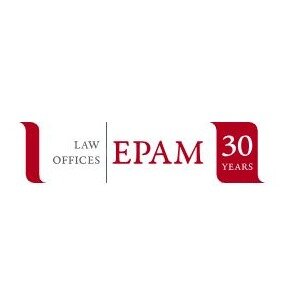
Best Franchising Lawyers in St Petersburg
Share your needs with us, get contacted by law firms.
Free. Takes 2 min.
List of the best lawyers in St Petersburg, Russia


Ivanyan and Partners

Duvernois Legal

Nevsky Prospekt, 88

Bespalov, Stogov and Partners

Advocate FREMM

EPAM Law Firm
About Franchising Law in St Petersburg, Russia
Franchising in St Petersburg, Russia, operates within the broader Russian legal framework which regulates commercial relationships, including those related to franchising or commercial concession agreements. Under Russian law, franchising is often referred to as a commercial concession, which allows a franchisee to utilize a franchisor's trademark, brand, and proprietary knowledge to do business. The franchising sector in St Petersburg is growing, with both international and local brands expanding their presence in the market. Despite the potential for profit, the complexity of legal arrangements in franchising requires a good understanding of Russian contractual, intellectual property, and commercial regulations.
Why You May Need a Lawyer
There are common situations in franchising where legal guidance is essential. When drafting, reviewing, or negotiating a franchise agreement, legal expertise helps in ensuring the terms are clear, fair, and compliant with Russian law. If you are considering franchising disclosure and registration requirements or dealing with franchise terminations and transfers, a franchising lawyer can provide invaluable assistance. Furthermore, legal counsel is important when addressing disputes, whether through negotiation, mediation, or litigation, and when ensuring the protection of intellectual property associated with the franchise.
Local Laws Overview
Franchising in St Petersburg is subject to the Russian Civil Code which outlines the general principles of franchising, including the rights and obligations of the franchisor and franchisee. Key aspects of local laws include the necessity for a written franchise agreement, protection of intellectual property rights, compliance with antitrust regulations, and adherence to specific disclosure obligations. Additionally, local legislation might also regulate the permit and licensing procedures necessary for the operation of a franchised business, making an understanding of both federal and local regulations vital for operating within the legal framework.
Frequently Asked Questions
What is a commercial concession agreement according to Russian law?
A commercial concession agreement, as per Russian law, is equivalent to what is known as a franchising agreement in many other jurisdictions. It is a binding contract whereby the franchisor grants the franchisee the right to use a business model, trademark, and related intellectual property to deliver goods or services.
How are intellectual property rights protected in a franchising agreement?
Intellectual property rights in a franchising agreement are protected under the Russian Civil Code and related legislation. These rights must be registered and properly included in the franchise agreement to ensure legal protection and to prevent misuse.
Is there a franchising disclosure requirement in Russia?
Russia does not have specific franchising disclosure laws as seen in some other countries. However, both parties must still adhere to the general requirement of good faith and provision of information critical to the agreement. It is advised to disclose important business information to avoid future disputes.
Can a franchise agreement be terminated early in St Petersburg, and how?
A franchise agreement can be terminated early by mutual consent or on grounds specified in the agreement itself. Termination can also occur due to breach of contract or under other circumstances detailed in the Russian Civil Code.
Are there any specific local permits needed for franchising operations in St Petersburg?
Local permits required will depend on the specific type of business being franchised. Typically, these could include health and safety permits, environmental licenses, and other industry-specific authorizations.
What role do antitrust laws play in franchising?
Antitrust laws in Russia ensure competition is not unreasonably restrained. When setting up franchise agreements, it's essential to ensure that the terms do not violate antitrust regulations, such as price fixing or market allocation.
What is the typical duration for franchise agreements in Russia?
Franchise agreements in Russia often have a duration of 5-10 years, but this can be negotiated between the parties. The term should be clearly stated in the agreement to avoid legal uncertainties.
Can foreigners own a franchise in St Petersburg, Russia?
Yes, foreigners can own a franchise in St Petersburg. However, they must comply with the same regulations as Russian nationals and may need additional support in navigating visa and business registration processes.
How are disputes in franchising typically resolved?
Disputes in franchising are commonly resolved through negotiations between parties, arbitration, or litigation in courts, depending on what dispute resolution methods are specified in the franchise agreement.
Are there specific laws for international franchisors in Russia?
International franchisors in Russia must comply with Russian law and may need to consider additional international trade rules and bilateral agreements affecting the franchising business. It is critical to consult with legal experts that have both local and international franchising law experience.
Additional Resources
Those in need of further information on franchising in St Petersburg can refer to the Federal Antimonopoly Service of Russia, the Russian Franchise Association (Российская ассоциация франчайзинга), and the Chamber of Commerce and Industry of the Russian Federation. Various legal databases, like Consultant Plus and Garant, also provide access to Russian legal documents and regulations.
Next Steps
If you are seeking legal assistance in franchising, it is advisable to contact local law firms that specialize in commercial law and have experience with franchising in St Petersburg. A lawyer can help you review or draft agreements, navigate local and federal regulations, protect intellectual property rights, and represent you in any disputes. It is common practice to arrange an initial consultation to understand your needs and learn how a lawyer can assist you in your franchising endeavors.
The information provided on this page is intended for informational purposes only and should not be construed as legal advice. While we strive to present accurate and up-to-date information, we cannot guarantee the accuracy, completeness, or currentness of the content. Laws and regulations can change frequently, and interpretations of the law can vary. Therefore, you should consult with qualified legal professionals for specific advice tailored to your situation. We disclaim all liability for actions you take or fail to take based on any content on this page. If you find any information to be incorrect or outdated, please contact us, and we will make efforts to rectify it.


